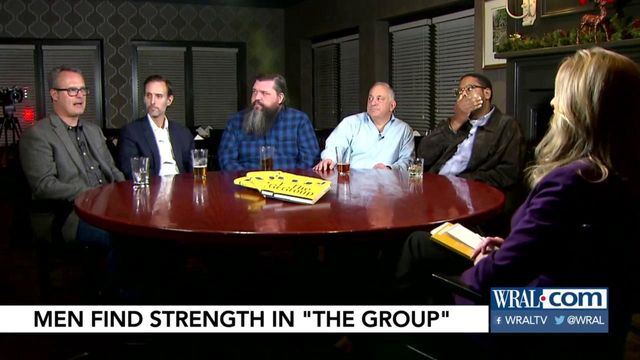Support group guides widowers from loss to hope
Neill Guy, Karl Owen, Russ Taum, Joe Ciriano and Bruce Ham are widowers, most having lost their wives to cancer. They lean on each other for the profound - as they weather their grief - and the prosaic - all are learning to be better full-time parents to children left behind.
Posted — UpdatedNeill Guy, Karl Owen, Russ Tatum, Joe Ciriano and Bruce Ham are widowers, most having lost their wives to cancer. They lean on each other for the profound – as they weather their grief – and the prosaic – all are learning to be better full-time parents to children left behind.
"We weren't looking to start a group, the need for one, really, found us," said Justin Yopp, associate professor of psychiatry at the University of North Carolina at Chapel Hill.
Together with his colleague, Donald Rosenstein, Yopp details the journey the men took to a new normal in a book called "The Group."
Both men work with the UNC Comprehensive Cancer Support Program, where they identified a need for the widowers group.
"Picture this very first night: Seven guys who didn't know each other. We're going around the table and everyone is telling the highly personal, brutal story of how their wives got sick and died," Rosenstein said. "It was hard to breathe at moments."
Guy remembers it as one of the toughest moments in a very tough time. But the men felt the need to open up. Ham says trust built very quickly.
"All of us were so broken and grief-stricken that we would do anything to get better, anything," he said.
The men came from different social circles, from different parts of the Triangle, but they shared a defining experience and recognized the need for a sanity check, Ciriano said.
Together, they built a support group to fill a need.
"It was a really safe place to share," Ham said.
"It's nice to have that sounding board that says, 'Hey, we're all really experiencing this'," Ciriano added.
"Making the decision to go back the second time was the best decision I had made," Guy said.
"Once a month, we would walk into that room, and there was nothing we couldn't put out there," Owen said.
"Our experience was so different than anything else that life had thrown at us," Owen said. "I think we all identified in one way or another that we needed each other's support to get through it."
Rosenstein recalled times the group looked to him and Yopp for answers.
"Something would come up, and a couple of the guys would turn and look at us like we're the experts and we're supposed to know, and Justin and I would be like, 'There are no textbooks, there are no papers, there's no conventional wisdom about this," he said.
Often, the "experts" would shrug and throw the question back to the group, Yopp said.
The Group began with a plan for six sessions. Four years later, they continue to meet.
Tears turn to laughter
Over time, tears gave way to laughter.
They'd share parenting challenges in the certainty that someone else was making the same mistakes.
Ham, who was left to raise three daughters, said, "I felt bad about myself when I compared myself with moms, but when I compare myself to y'all, I'm pretty good.
"I'm a much better dad because I had to step up to the plate and do things I would have never considered doing when you have a partner," he said.
Together, the men recovered from the shock of loss, learned to guide their children to stability and began to think about the future.
Together, they had to figure out when the time was right to get back in the dating pool.
Owen noted that since the men lost their spouses around the same time, they were going through the stages of grief together.
"We each wrestled with how long we kept our wedding rings on, when we were feeling ready to date, what that would mean and what message that would send to our kids," he said. "That was an intense couple of months of conversations for all of us."
Dating brought more questions and, for Owen, a difficult decision. He ended a relationship with a woman rather than face her medical condition.
"You don't want to lose again, you know," Ham said. "It's too hard."
Two of the men have remarried. A third is engaged.
Paying it forward
The original group continues to meet, although they see Yopp and Rosenstein less often.
Rosenstein credited them with the idea to put their stories in a book.
"It was actually the goal of the guys in the group," he said. "Once we had gotten past kind of the initial hump of this whole thing, they essentially said, 'What about other guys who are out there?'"
They wanted to spread a message of hope over time.
"If we can get through this, anybody can get through anything," Ham said, "and there can be great happiness at the end of grief."
"I actually believe that anyone reading the book will understand," Tatum said. "Although it's not a common situation, you're not alone. There's another opportunity for growth, there's an opportunity for moving on."
Guy concluded with a clarifying message. "I'm not going to say it gets better, but it gets easier," he said.
• Credits
Copyright 2024 by Capitol Broadcasting Company. All rights reserved. This material may not be published, broadcast, rewritten or redistributed.





